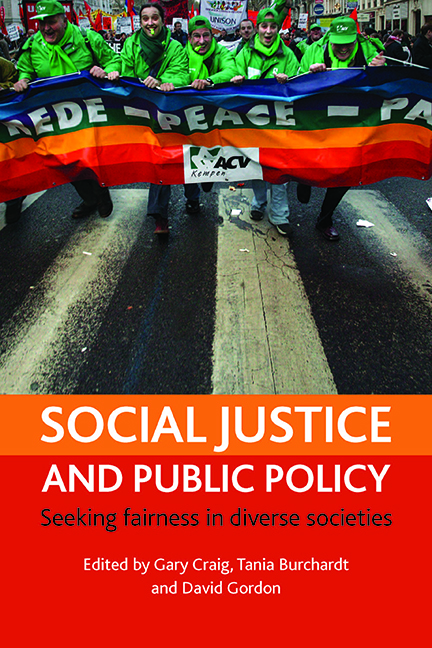Book contents
- Frontmatter
- Dedication
- Contents
- Acknowledgements
- Notes on contributors
- Introduction
- one Social justice and public policy: a view from political philosophy
- two Social justice and public policy: a social policy perspective
- three Multiculturalism, social justice and the welfare state
- four Structural injustice and the politics of difference
- five Recognition and voice: the challenge for social justice
- six Globalisation, social justice and the politics of aid
- seven Social justice and the family
- eight Children, policy and social justice
- nine Social justice in the UK: one route or four?
- ten Monitoring inequality: putting the capability approach to work
- eleven The limits of compromise? Social justice, ‘race’ and multiculturalism
- twelve Understanding environmental justice: making the connection between sustainable development and social justice
three - Multiculturalism, social justice and the welfare state
Published online by Cambridge University Press: 19 January 2022
- Frontmatter
- Dedication
- Contents
- Acknowledgements
- Notes on contributors
- Introduction
- one Social justice and public policy: a view from political philosophy
- two Social justice and public policy: a social policy perspective
- three Multiculturalism, social justice and the welfare state
- four Structural injustice and the politics of difference
- five Recognition and voice: the challenge for social justice
- six Globalisation, social justice and the politics of aid
- seven Social justice and the family
- eight Children, policy and social justice
- nine Social justice in the UK: one route or four?
- ten Monitoring inequality: putting the capability approach to work
- eleven The limits of compromise? Social justice, ‘race’ and multiculturalism
- twelve Understanding environmental justice: making the connection between sustainable development and social justice
Summary
Introduction
One of the major challenges facing Western societies concerns increasing ethnocultural diversity. There are three diversity-related trends that are transforming Western societies:
• the increasing ethnic and racial heterogeneity of the population;
• the increasing politicisation of ethnocultural identities, and the rise of ‘identity politics’; and
• partly in response to the first two trends, the increasing adoption of ‘multiculturalism’ policies to accommodate ethnocultural groups.
In short, there are changes in demographic composition, political mobilisation, and public policies.
These diversity-related trends pose several challenges for the pursuit of social justice. First, there are questions about the fairness of multiculturalism policies themselves. How can society fairly accommodate differences in language, culture and religion? In a democracy, public institutions are likely to be shaped by the culture of the dominant group. When does this result in injustice against minority groups, and what forms of accommodation or recognition can remedy these injustices?
Second, these trends raise indirect challenges for the pursuit of social justice. It is widely believed that the increasing presence and politicisation of ethnic and racial diversity is jeopardising the pursuit of more traditional issues of social injustice, particularly class-based economic inequalities. There is a fear that multiculturalism will erode the sense of national solidarity and common citizenship that underpins the welfare state, and hence erode the capacity of the state to engage in economic redistribution.
In this chapter, I will explore these two challenges. What is the relationship between fairness in the accommodation of diversity (through multiculturalism policies) and fairness in the distribution of economic resources (through the welfare state)? I will start by outlining some current work on multicultural citizenship, and then examine the concern that there is a trade-off between multiculturalism and the welfare state.
Making sense of multiculturalism
Across the Western democracies, minority ethnic groups are demanding greater recognition and accommodation of their distinctive identities. In some cases, they seek only greater protection, on a non-discriminatory basis, of the familiar set of civil, political and social rights of citizenship that are protected in all constitutional liberal democracies. But in many cases, they also seek a more ‘multicultural’ conception of citizenship, one that includes various group-specific rights regarding their language, religion or culture in addition to the common individual rights of citizenship.
- Type
- Chapter
- Information
- Social Justice and Public PolicySeeking Fairness in Diverse Societies, pp. 53 - 76Publisher: Bristol University PressPrint publication year: 2008



